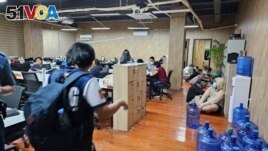03 September 2023
The United Nations human rights office says criminal groups have forced hundreds of thousands of people in Southeast Asia into unlawful online scam operations.
A scam is a dishonest way to make money by tricking people.
The Office of the U.N. High Commissioner for Human Rights released a new report on the issue on Tuesday. It said that at least 120,000 people in Myanmar and about 100,000 in Cambodia "may be held in situations where they are forced to carry out online scams."

FILE - In this photo provided by the Philippine National Police Anti-Cybercrime Group, police walks inside one of the offices they raided in Las Pinas, Philippines, on June 27, 2023. (Philippine National Police Anti-Cybercrime Group via AP, File)
Cybercrime scams have become a major problem in several Asian countries. Many workers are forced to join in scams targeting people over the internet. Criminal groups have increasingly targeted migrants. They offer false promises of real employment to the victims.
The U.N. rights office said it is hard to estimate how many people are caught up in such operations. It is also difficult to know how much money the criminal groups make through their scam operations. But it is believed to be in the billions of U.S. dollars every year.
Some victims have been subjected to torture, cruel punishments, sexual violence and other crimes, the rights office said.
Pia Oberoi is a senior advisor on migration and human rights for the Asia-Pacific area at the U.N. human rights office. She described two kinds of victims: people who have lost large amounts of money and people trafficked into working for the scammers.
Oberoi told reporters in Switzerland that many of the scams started during the COVID-19 pandemic. Lockdowns shut down casinos that were an important part of the economy along boarder areas and in Cambodia. The closures caused "economic distress" that left "middle class, educated...young people" out of work. Many of them got talked into working for the schemes.
In May, leaders from the Association of Southeast Asian Nations agreed in a meeting in Indonesia to increase border controls and law enforcement. And they agreed on increasing public education to fight criminal groups that traffic workers to other nations, where they join in the online scams.
I'm Gregory Stachel.
Jamey Keaten reported this story for The Associated Press. Gregory Stachel adapted the story for VOA Learning English.
________________________________________________
Words in This Story
cybercrime – n. criminal activities carried out by means of computers or the internet
casino – n. a building or room that has games (such as roulette or blackjack) for gambling